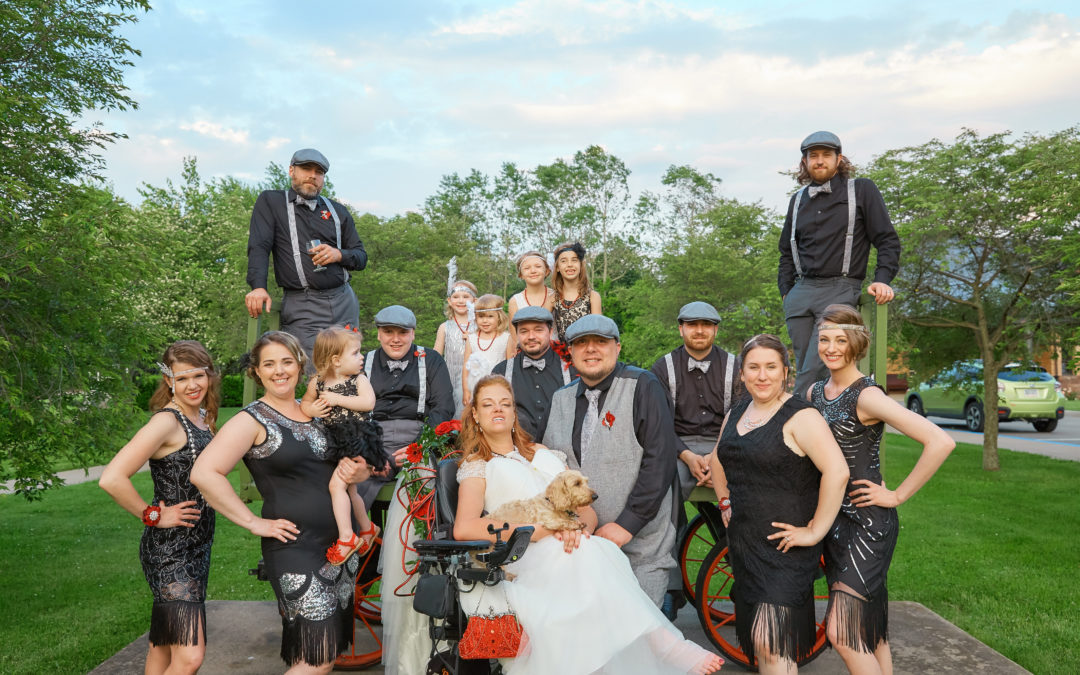Caption: Josie Badger poses with her husband, Mike, their dog, and their wedding party
Not long ago, I remember the excitement that spread across America when the Supreme Court decided that “love ruled,” giving the right of marriage to gay couples. News articles, Facebook posts, and email subjects all celebrated the news of “marriage equality.” It was a long-awaited day—finally a day to celebrate the civil right of marriage. Since then, a majority of Americans assume that marriage equality is a right for everyone throughout the country; however, this right does not include all of us.
For people with disabilities, if you are one of the lucky ones, you have been made aware of the potential risk of reduced or loss of benefits that can accompany marriage. However, there are countless couples with disabilities that return from their honeymoon just to find out that they have lost life-sustaining supports or services.
America has a history of taking extensive measures to ensure that people are not abusing the system. Supports such as Social Security, Medicare/Medicaid, and home and community-based waivers are based on medical and personal (readily available no cost care) necessity, and as such individuals must meet a list of requirements in order to qualify. An individual’s eligibility for any of these services is often founded on household income and assets, regardless of the needs of the individual or family. In other words, the income and assets of the family, including a spouse, is used to determine whether an individual can receive services.
For couples where one or both individuals require supports, such as social security income, there are significant disincentives to marriage. Once a couple is married, their joint income and assets (including savings and retirement) is considered in determining eligibility for supports and premiums. In certain situations, the couple could individually receive a certain income and still qualify for services such as medical assistance, but jointly (legally married), their income could make them ineligible for the service. In other situations, the government will reduce the cash benefits for the couple because it is believed that they need less assistance since they will be sharing a home, food, etc., and therefore may not need as much support.
For people with disabilities, these programs and supports are non-negotiable, providing literally life-sustaining support. Individuals with disabilities—especially those relying on Medical Assistance and Home and Community Based Services—do not have the freedom or right to choose marriage. When a person is forced to decide between marriage and survival, survival must take precedence. Love has not yet won for us.
When I first met my husband, I knew that legal marriage was not going to be an option. I am completely reliant on medical assistance and waivers to allow me to lead home and work lives. Even though his job provided great insurance, private insurance will not cover what I need to survive. We decided to be “married by the church”, which is similar to a commitment ceremony. Although we made the best of the situation and really enjoyed our wedding, this was the only choice we had. We are already seeing some of the barriers that not having a legal marriage can have. We’ve always dreamed of having a family, and didn’t realize the issues we would run into without a marriage certificate. Buying a house, applying for loans, filing taxes, and many of the other benefits that come with being married, are not possible for us. Not to mention no one really knows what to call us or how to address our Christmas cards.
Having different last names doesn’t really bother us (I prefer my name anyhow); what bothers us is that we will never be recognized as “married” in the eyes of the government. So much has been done to make sure that people have equal rights and we as a society have truly come a long way, but when it comes down to it, we as individuals with disabilities just don’t have the same rights. We’ve been told “it shouldn’t matter as long as you love each other. Why do you need to be legally married?” But that’s the same ableist mentality that society takes on most disability access issues. Why should our disabilities prevent us from doing or aspiring towards the things that most other people take for granted?
Did you like this article? Are there other topics you’d like to see us publish on? Do you want to apply to be a guest blogger? Please take our quick, 3-question survey and let us know what you think!
Take Survey: http://survey.constantcontact.com/survey/a07eg1rmj5jjrasph9l/start


